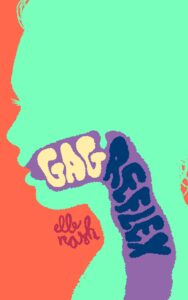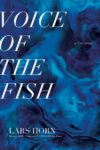
[Clash Books; 2022]
Remember LiveJournal, the popular blog platform of the 2000s? Across thousands of personal blogs, teens and young adults chronicled their daily lives and formed communities around common interests and experiences. Sometimes associated with third-wave “emo” culture, writers used LiveJournal to post fiction, personal updates, art, and more. In Elle Nash’s new work of fiction, Gag Reflex, the author draws from her time participating in an eating disorder group on LiveJournal to tell the story of a young woman’s struggle with graduating high school, navigating relationships, and tracking calories. The book is both a thoughtful reflection on late adolescence and an artifact preserving a lost online culture.
Gag Reflex is a quick read. The story is told through journal entries, snippets of chatlogs, and occasionally blog post comments. Some pages present nothing more than a weekly calorie count, such as:
wednesday- fast 6am-6amthursday– 400 calsfriday– fast 6am -6am
saturday–900 calsfast 6am-6am 🙂
sunday- 400 cals
monday- 600 cals
tuesday- fast 6am-6am
wednesday- 200 cals
Each page is formatted as a LiveJournal entry with the user’s URL at the top alongside site links, post title, and date. At the lower right, there is consistently a “current music” update, always some sort of nu-metal band popular at the time, like nothingface, Drowning Pool, or Type O Negative. Alongside the music updates, there is a comment count, i.e. [16 comments].
The faux-LiveJournal structure of the novel has an epistolary effect. Authors from Alice Walker and Octavia Butler to Steven King and Ocean Vuong have told stories in the epistolary form, using letters and journal entries as the content. Modeling a novel on forms of journaling and written correspondence provides an element of structural realism that makes the reader feel both more immersed in the story and perhaps a bit voyeuristic.
Updates on LiveJournal were posted online for others to see and comment on—a semi-public forum. In Gag Reflex, the updates track details of a young woman’s eating disorder and her evolving sexual identity. The voyeuristic feeling is offset by the semi-public nature of the content. I say semi-public because the main character, Lucy, belongs to a LiveJournal group populated by other people with eating disorders and those people form the audience for her posts. The group is not exactly pro-anorexia, but it is not exactly pro-recovery either. Group chat topics range from fantasizing about binge eating to encouraging one another not to eat. This segment of a conversation between Lucy (aka lucifer_dramamine) and her online friend, hungerbound, shows the detrimental support members engage in:
hungerbound (10:23:15 PM): help, I’m fucking up
lucifer_dramamine (10:23:31 PM): look at trigger pics
hungerbound (10:23:15 PM): it’s not helping
lucifer_dramamine (10:23:31 PM): i’ll hit you with the satanic statements
hungerbound (10:23:15 PM): okay
lucifer_dramamine (10:23:31 PM): taste is a temporary desire. When you satisfy it, it only grows. Thin is a constant desire. When you satisfy it, it only shrinks
lucifer_dramamine (10:23:31 PM): thin is a skill
lucifer_dramamine (10:23:31 PM): an imperfect body reflects an imperfect person
At an earlier point in the novel, hungerbound delivered the same maxim to Lucy, demonstrating the self-perpetuating nature of how an online “support” group may help someone psychologically maintain self-harming behaviors. No one in Lucy’s real life encourages her to lose weight or starve herself, but on LiveJournal, she can have her desires confirmed. It’s unclear how well other members of the group know Lucy outside of their common interests in counting calories and binging on strange combinations of junk food. In spite of the unhealthy dynamics of the group, it’s also hard to say that Lucy would be better off without them, as her life at school and her social life fail to support her or outright take advantage of her vulnerability.
Offline, Lucy’s days consist of skipping school to spend time with boys, specifically Brian and Mike. These boys both have girlfriends and sleep with Lucy on the side. Her parents are largely absent from the novel, as they are largely absent from her life. She attends school sparingly and without particular success in spite of the talented writing she features prominently on her LiveJournal. The novel’s plot meanders through her sexual and drug exploits with the boys during her senior year and into the years after high school, where she eventually falls into a disappointingly hollow polyamorous relationship.
The novel provides insight toward and empathy with people struggling with disordered eating and shows how online social groups and real-life communities can exacerbate or perpetuate those struggles, but, beyond those central themes, there are several paradoxical aspects to reading Gag Reflex worth discussing.
First, recreating an online blogging platform in a print book begs the question: Why create a print book for this project? Of course, a print book is a product and a way to connect with a literary audience. However, even if the story wasn’t told on LiveJournal itself, an online recreation of LiveJournal would offer the writer a broader array of variables to play with and perhaps a more authentic representation of how social media works to reinforce problematic behaviors and mental health challenges. Imagine if readers could actually explore the comments on a post rather than plainly see there are imaginary, inaccessible comments. What would they say? How would they influence Lucy’s decisions and actions? When the comments are included in the novel, they are clearly selected for storytelling considerations, but the mystery of what else might lie below the surface of the blog posts makes the reader wonder what the “real” LiveJournal might be like to read. Put another way, recreating the more dynamic and interactive blogging format on the printed page highlights the limitations of print compared to digital platforms and it would be interesting to see this book presented as a more interactive webpage.
The second paradoxical aspect of reading Gag Reflex comes from the writing itself, which mixes teen angst with carefully crafted adult prose. Perhaps I am underestimating how well an eighteen-year-old blogger writes, but Lucy’s control of language and syntax seem at once written by a teenager and by an adult reflecting upon being a teenager. I’ll say up front that I do not think using well-crafted “adult” prose was a bad choice and, in fact, it makes the novel more engaging than intentionally dumbed-down writing meant to more generally and stereotypically represent teenage language. I’ll also mention here that I have taught high school and college for nearly twenty years and I’ve reviewed untold pages of prose by students in Lucy’s age demographic, which is what makes this question of teenage language authenticity of interest to me.
Here is a sample of Lucy’s writing that strikes me as notably mature. In a post dated April 8, 2005, Lucy writes, “i came home and listened to Otep’s ‘Blood Pigs’ on repeat for two hours, processing. the way her anger sounds outside of language, every time i listen i memorize a new line. wish i could turn my pain over the way she does, tumble it until it was something pristine and presentable.” The story asks readers to accept that a teenager who can think “outside of language” was not accepted into a SUNY school, which is plausible, but would likely haunt a talented young writer like Lucy and factor into her low self-esteem more prominently than it does in the novel. Maybe we are supposed to accept that Lucy just doesn’t care, but, from my experience teaching, it’s generally my impression that those who are capable of success wrestle with failure to live up to their potential, even when it’s their mental health challenges or trauma thwarting their achievement.
At another point, Lucy says, “i get off my little vermin wheel and grab a cup of coffee, count the calories in my teaspoon of creamer and drift to my shitty little room at the back of the trailer, with the window watching over the street that embodies all of my teenage years. i think to myself: i have to get out of here.” The passage feels more reflective upon teenage years than immersed in them because few teenagers have the self-awareness to recognize their day-to-day life as a stage. This observation is not a criticism of teenagers, but highlights the adult retrospective perspective mixed into Lucy’s teenage awareness. Both examples here question whether Lucy’s talented writing is a character trait or part of the craft of the novel—a decision to explain Lucy’s thoughts more lucidly than the character appears capable of based on her behaviors.
Of course, I could be completely wrong and Elle Nash could have lifted these passages from the LiveJournal blog she cites as the inspiration for the novel in the Acknowledgements at the end of the book. Again, as a former high school teacher and current college instructor, I recognize that some young people are extremely talented with languages, and if you told me Nash wrote some of this in high school, I would not be surprised. Even in the case that the writing is actually uncharacteristically skilled teenage prose, the adolescent emotions and experiences described in mature language work to make the story of Lucy’s online life, her social and sexual struggles, and her eating disorder deeper and more engaging than if Nash attempted to recreate something like more authentic teenage diction. What we get instead of boring, even banal, authenticity is an author exploring teenage struggles from a mature, experiential point of view—youth fortified with adult insight.
As this novel is about a young woman with an eating disorder, the value of an adult writing about a teenager suffering from dysmorphia lies in the potential for empathy. Adults remembering their own teenage thoughts and feelings may assess those memories as trivial, formative, or transient. Nostalgia can warp memory away from reality. But to a teenager, their thoughts and feelings are as immediate and meaningful as they will be at any later point in life. In some sense, teenage experiences lay the groundwork for our adult outlooks and can even carry outsized importance in defining our senses of self. For Lucy to describe teenage thoughts and feelings in adult prose is to force the reader to recognize the importance and complexity of her teenage mind and, hopefully, understand and care for the teenagers in their own lives more effectively.
Consider the clarity and detail of how Lucy describes her feeling of disconnection from her body, “a while ago i wrote about the feeling of being trapped in a body that was not mine.. comparing it to a gender crisis, where boys feel they are trapped in girl bodies and vice versa. i feel like i’m just the wrong person. i’m so out of my head because I experience my body differently than most people would experience theirs. i look down and it feels “wrong” in a sense.” Much of what media projects about teenagers and eating disorders emphasize social causes, such as unattainable beauty standards on social media. In these narratives, anorexia and other forms of disordered eating become manifestations of self-esteem; they are shown primarily as responses to the outside world predicated upon the desire to model oneself, however unhealthily, on the ideal of thinness. Without diminishing the effects that unattainable body standards actually have on teenagers, Lucy’s description of a psychological phenomenon originating from within her—disconnect between body and mind—explains dysmorphia with nuance that dispels the idea that a teenager would exclusively torture themself out of vanity or conformity.
A few lines later, Lucy contemplates the mind/body connection to understand her own feeling of alienation from her body, writing, “at times i know the body is a vessel in which the mind lingers, and i know the mind cannot exist without the body so this [the eating disorder] can’t really be an attempt to disengage the mind from the body.. as doing so would destroy the mind in the process and leave me with nothing, or at least something unknown and not expressable in this world.” In a sense, LiveJournal, and social media more broadly, do disconnect the mind from the body. A photograph posted online, doctored with filters or photoshop, reflects the mind’s ideal of what the body should look like. Posts and updates, whether video or text, offer only glimpses and snippets of someone’s life, a thin line to try to draw a complete person from. On a text-based site like LiveJournal, the body becomes almost hypothetical, allowing users like Lucy and hungerbound to encourage damage to bodies they will likely never see and can only imagine. Gag Reflex, like the LiveJournal posts that it’s modeled on, constructs a person from text posts, a life from numbers and chatlogs, in some of the same ways we naturally construct people from the social media accounts we subscribe to and read. A final paradox to the novel is that Lucy is not a real person, she is a fictional character, yet her story provides a notable reminder of the real people behind the posts and updates we encounter every day.
You can read Eric Aldrich‘s recent work in Terrain.org, Euphony, Essay Daily, and Deep Wild. He lives in Tucson, Arizona; ericaldrich.net; @EricJAldrich on Twitter.
This post may contain affiliate links.







